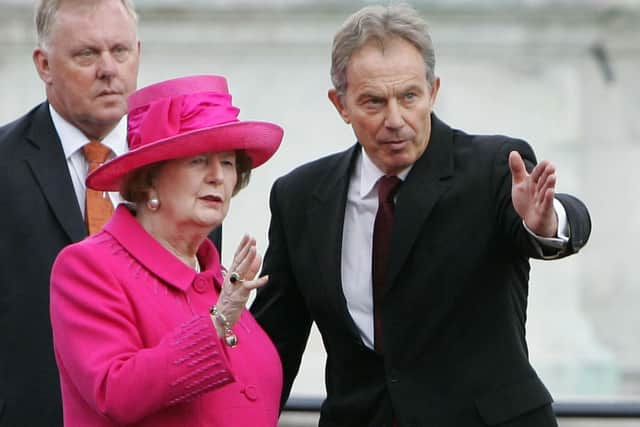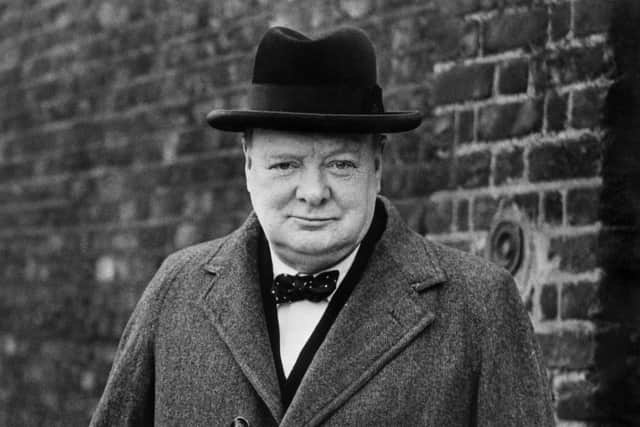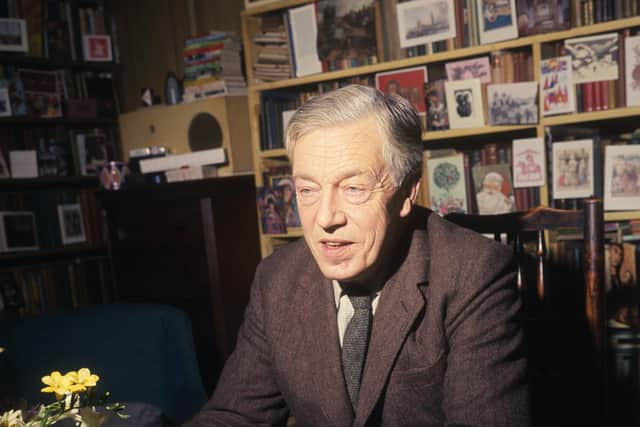National Archive releases reveal secrets of Margaret Thatcher, Tony Blair and Winston Churchill
Government papers released by the National Archives in Kew, south-west London, lay bare the extraordinary in-fighting and backbiting which surrounded the appointment to one of the most prestigious positions in world of English literature.
Some of the most eminent poets of the time were denounced as drunkards, snobs, communists, mentally unstable and the authors of extreme pornography, as supporters of potential candidates – and in some cases the candidates themselves – advanced their rival claims.
Advertisement
Hide AdAdvertisement
Hide AdBetjeman’s name first came up for consideration in 1968 following the death of the then laureate, John Masefield, at the age of 88.


It fell to Prime Minister Harold Wilson to advise Queen Elizabeth on the appointment of a successor, with No 10 appointments secretary John Hewitt being tasked to take soundings on who could take on the role.
With the two men regarded as the leading poets of the day – WH Auden and Robert Graves – ruled out for differing reasons, it quickly came down to a choice between Betjeman and Cecil Day-Lewis, father of actor Sir Daniel Day-Lewis.
Betjeman – perhaps best-known now for his lines “Come friendly bombs and fall on Slough!/It isn’t fit for humans now” – had the higher public profile through his appearances on television.
Advertisement
Hide AdAdvertisement
Hide AdHowever, Lord Goodman, chairman of the Arts Council and Mr Wilson’s personal legal adviser, was among those to weigh in against him, warning that to offer him the post “would not be to take the matter seriously”.


“The songster of tennis lawns and cathedral cloisters does not, it seems to me, make a very suitable incumbent for the poet laureateship of a new and vital world in which we hope we are living,” he wrote dismissively.
“An aroma of lavender and faint musk is really not right for an appointment of this kind at this moment.”
His intervention appeared decisive – although there was not much more enthusiasm for Day-Lewis, who was described by Geoffrey Handley-Taylor, chairman of the Poetry Society, as no more than “a good administrative poet”.
Advertisement
Hide AdAdvertisement
Hide AdThat was nothing, however, to the vitriol faced by Auden when the post again fell vacant four years later following the death of Day-Lewis.


Auden was not actually eligible as he had taken US citizenship after moving to America at the outbreak of the Second World War in 1939 – a move still deeply resented by some.
But with speculation rife that he could return to the UK and reclaim his British nationality in order to take the post, a furious Jon Stallworthy, another poet and literary critic, warned No 10: “For him now to turn his coat again would make a mockery of the laureateship.”
Worse was to come.
Ross McWhirter, co-founder of the Guinness Book of Records, contacted Sir John Hewitt (who had by this time been knighted) to say that Auden was believed to be the author of a pornographic poem.
Advertisement
Hide AdAdvertisement
Hide AdWhen he met Sir John in Downing Street to discuss his concerns, Mr McWhirter acknowledged that Auden had not admitted writing the offending lines, but said he had not denied it either.
“He then produced a copy of the paper and showed me the poem by ‘WH Auden’ which ran to about 30 verses of an utterly revolting character,” Sir John wrote.
Thatcher and Blair
The newly-released files also tell how Margaret Thatcher privately wrote to Labour prime minister Tony Blair to praise his staunch support for the United States in the aftermath of the 9/11 attacks.
For years, Baroness Thatcher was a thorn in the side of her Tory successor, John Major, but she could hardly have been more effusive in her admiration for Mr Blair – who she once described as her “greatest achievement” for steering Labour away from the left-wing policies of the 1980s.
Advertisement
Hide AdAdvertisement
Hide Ad“You will have found, as I did, that just as one international crisis subsides, another soon threatens,” she wrote in a handwritten note dated April 4 2002, seven months after al Qaida passenger jet hijackers carried out four co-ordinated suicide attacks, including on the Twin Towers in New York City.
“I greatly admire the resolve you are showing. You have ensured that Britain is known as a staunch defender of liberty, and as a loyal ally of America. That is the very best reputation our country can have.”
She signed off: “With all good wishes, Margaret T.”
Another admirer of Mr Blair’s response to the crisis was former Liberal Democrat leader Paddy Ashdown, who emailed to say: “Heavens – what a wonderful speech. Just what the country needed. It will have daunted your enemies, thrilled your friends and comforted those who doubt.”
The files, released to the National Archives at Kew, west London, also include a letter to Mr Blair from Tory former defence minister Sir John Stanley, written just days after 9/11, warning of the need to prepare for an imminent terror attack in the UK using weapons of mass destruction (WMD).
Advertisement
Hide AdAdvertisement
Hide AdHe wrote: “I wish to urge most strongly that your Government bases its security, civil defence and intelligences resourcing and deployment policies on the assumption that a terrorist WMD attack on one or more of the centres of population in the UK will be attempted and attempted in the near and foreseeable future.
“The vulnerability of British people, particularly those living in urban areas, to terrorist attack is, I suspect, all too great.”
In response, Mr Blair said that while he shared his concerns and had ordered a security review, the greatest threat remained a conventional attack.
The Italian Job
Meanwhile, Tony Blair was desperate to avoid claims he was “snuggling up” to Silvio Berlusconi while seeking to develop him as an “essential” ally within the EU, according to newly released official files.
Advertisement
Hide AdAdvertisement
Hide AdPapers released to the National Archives show No 10 officials were highly nervous as to how a planned summit meeting with the controversial Italian prime minister would be portrayed in the British media.
At the same time, they believed an apparent shift in a more Eurosceptic direction by Mr Berlusconi’s government offered an offered a chance to counter French and German ambitions for a more integrated EU.
Britain’s ambassador to Rome Sir John Shepherd told No 10 there was a “real opportunity” to work together while “holding our noses and staying alert to the risks as we do so”.
The Rome summit, in February 2002, came as Mr Berlusconi – who died earlier this year – was in the headlines following controversial comments on the supposed “superiority” of Western civilisation.
Advertisement
Hide AdAdvertisement
Hide AdAt the same time, he was embroiled in fresh allegations of corruption, which dogged his political career, while causing dismay in some EU capitals after sacking his pro-EU foreign minister while appointing a former fascist to a convention on the future of Europe.
In the Foreign Office, David Whineray said No 10 had unusually decided not to take the lobby journalists, who normally travel with the prime minister on overseas visits, as they sought to play down the meeting in the British media.
“We will want to avoid ‘Blair snuggles up to Berlusconi’ headlines,” he wrote, adding that they were seeking to frame it as an ‘Italy-UK (not Blair-Berlusconi) summit’.”
He said any media appearances by Europe Minister Peter Hain, who was accompanying Mr Blair, should be carefully targeted on programmes where the line of questioning was likely to be “soft”.
Advertisement
Hide AdAdvertisement
Hide Ad“I recommend against offering Mr Hain to the Today programme (as they are likely only to be interested in Berlusconi),” he advised.
In a briefing for No 10 ahead of the summit, Sir John said Mr Berlusconi was determined to hang on, having spent 50 billion lire in 2000 alone on legal fees before the Italian currency was replaced by the euro.
Ukraine
Mr Blair was urged not to snuff out Ukraine’s aspirations to join the EU amid hopes that it could form a “formidable barrier” to Russian expansionism, according to newly released papers.
Files from the early 2000s released to the National Archives in Kew show UK officials found the Ukrainians were desperate to realise their “European vocation” but were depressed at the way they were “rubbished” in the West.
Advertisement
Hide AdAdvertisement
Hide AdIn what now seems like a highly prescient warning, the Ukrainians expressed concern that the US and the Europeans had “too rosy a view” of Russian president Vladimir Putin.
In September, Ukrainian president Leonid Kuchma wrote directly to Mr Blair appealing for his support in achieving their long-term goal of “full-scale European and Euro-Atlantic integration, including the full-fledged EU membership”.
Eton Rifles
As Allied forces fought their way into Germany in the closing months of the Second World War, Winston Churchill was forced to take time off from directing Britain’s war effort to attend to a crucial matter – the appointment of a new provost of Eton College.
Official files newly released to the National Archives show how – in war and in peace – successive prime ministers were required to break off, at least briefly, from the other matters of the day to consider the administration of the UK’s most exclusive public school.
Advertisement
Hide AdAdvertisement
Hide AdUnder Eton’s statute, the provost – who heads the board of governors known as the fellows – is appointed by the sovereign on the advice of the premier of the day.
So in October 1944, Churchill found himself presented with a dilemma – the shock resignation of the incumbent provost, Lord Quickswood. He was replaced by Sir Henry Marten.
